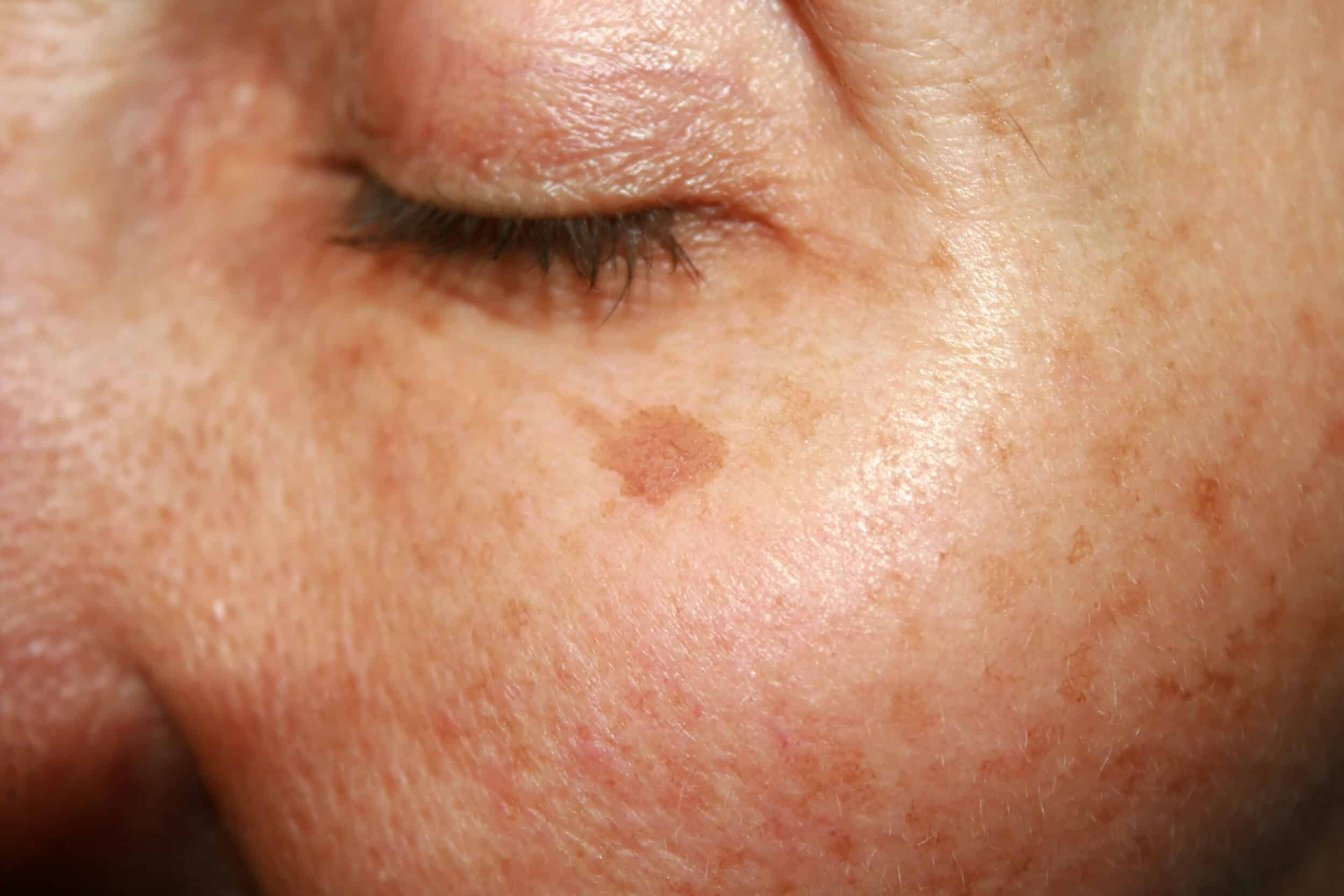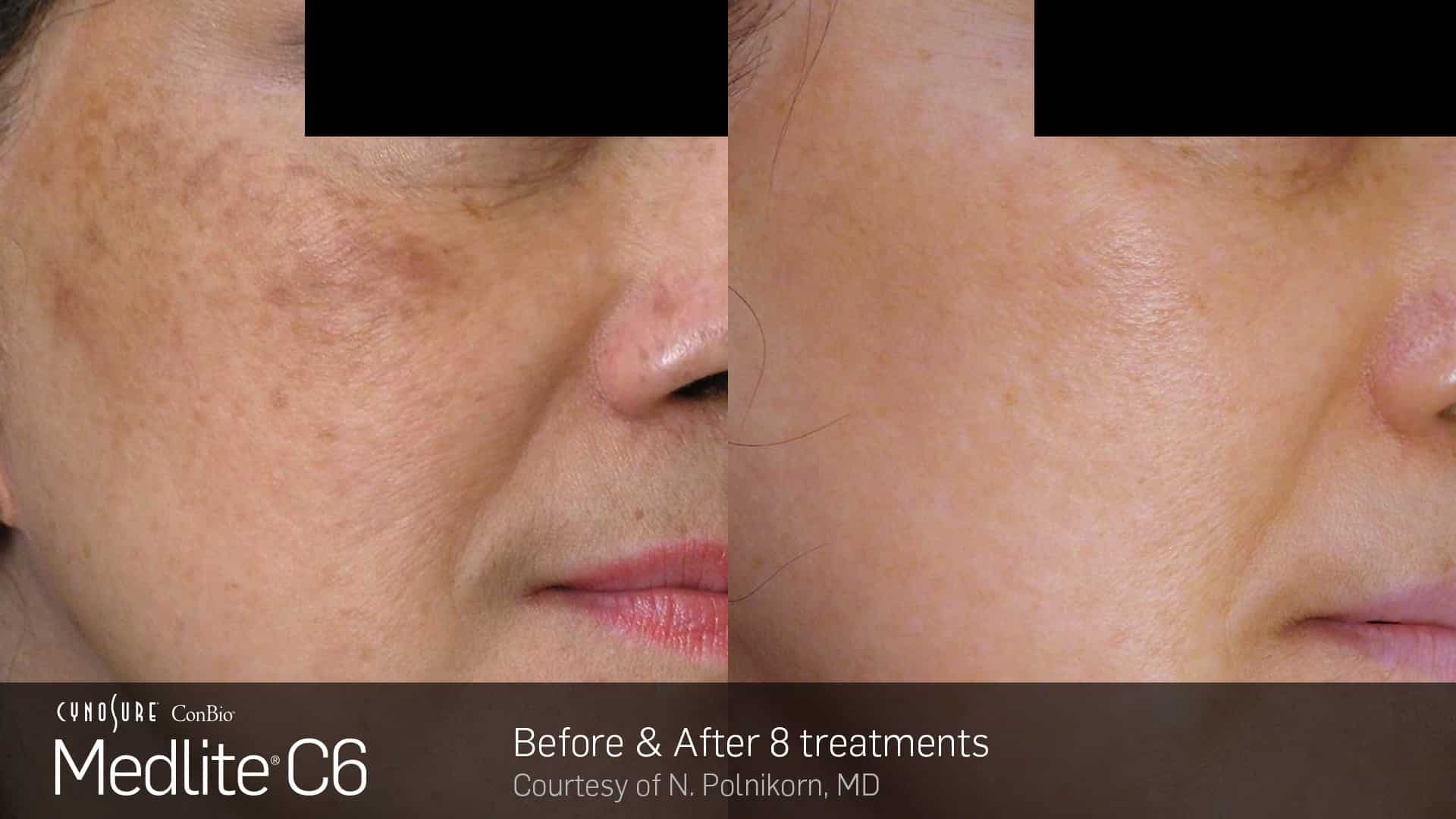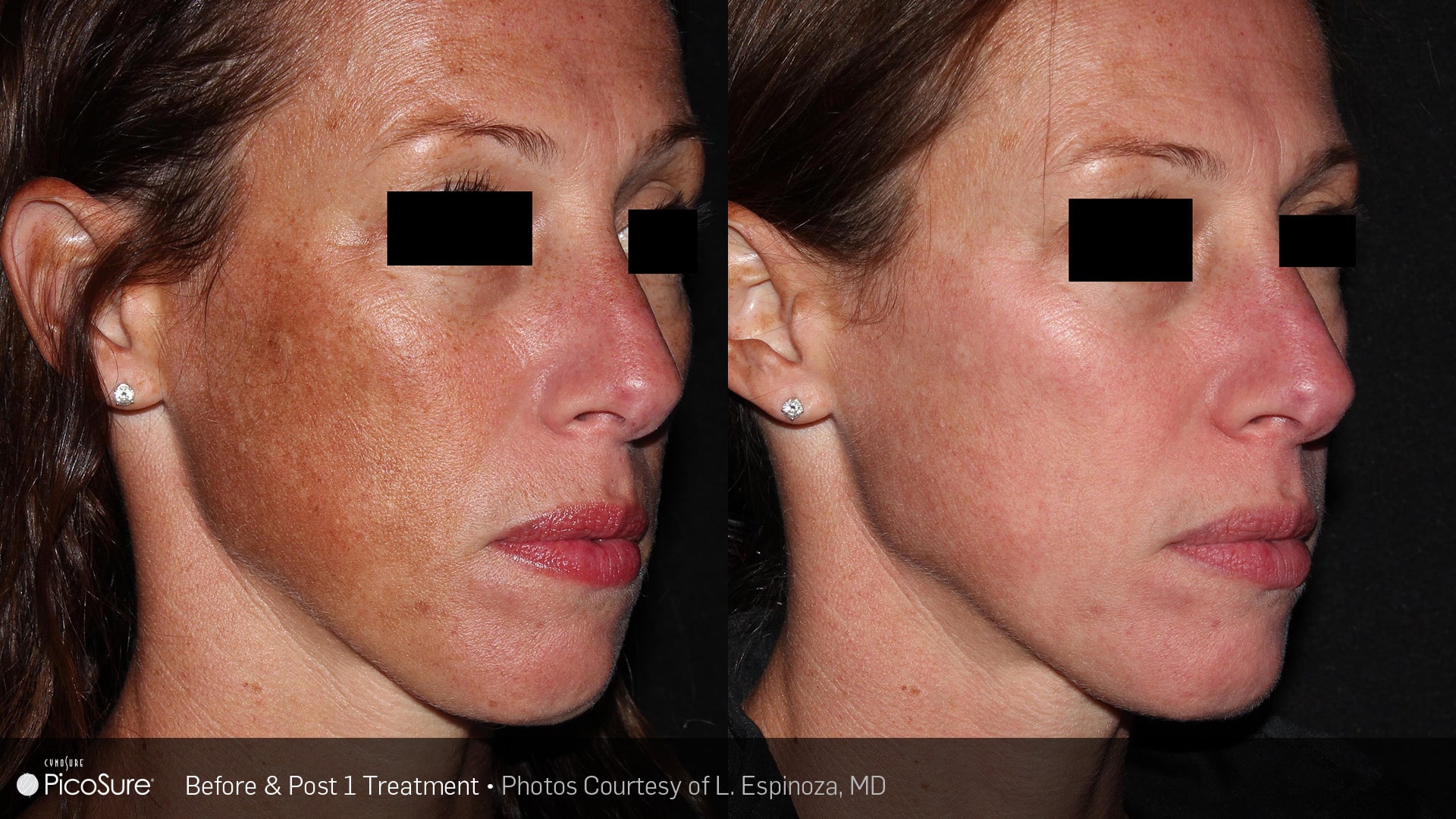Pigmentation issues such as brown spots, sun damage, or liver spots can make you look older than you are. On the other hand, clearing up your complexion can help you look noticeably younger and more vibrant.
If you’re near Mechanicsburg, Pennsylvania, Dr. Deborah Farrell can treat your skin pigmentation issues using the MedLite®, PicoSure™, or Iriderm laser treatments.

How Is Laser Skin Pigmentation Treatment Performed?
Laser skin pigmentation treatments use specialized laser energy to target specific layers of the skin. These treatments help break down pigmentation irregularities and boost collagen production for healthier-looking skin. Below are some of our options that work for different skin concerns:
MedLite®
The MedLite® laser is a Q-switched Nd:YAG laser, a type of laser that works by sending short, powerful bursts of energy to break up dark spots and uneven pigmentation on the skin. It’s great for treating surface-level concerns like sun damage, melasma, or discoloration, and it can also help smooth out skin texture and improve elasticity. MedLite® focuses on clearing up visible pigmentation and refreshing the skin’s appearance. It’s also commonly used for precise treatments like tattoo removal.

PicoSure™ Skin Revitalization
The PicoSure™ Skin Revitalization laser is unique because it uses targeted pulses of energy (called picosecond technology) to reach the deeper layers of your skin. This stimulates collagen production to improve your skin’s firmness and gives it a more youthful appearance over time. Before the treatment, Dr. Deborah Farrell applies a topical anesthetic to keep you comfortable. The laser then works beneath the surface of your skin to address problem areas without damaging the outer layer.

Iridex Iriderm
The Iriderm Diolite laser is a 531 nm laser that is used to treat dark spots, age spots, redness, rosacea, and visible blood vessels. The Iriderm laser system uses precision laser therapy to remove pigmented and vascular lesions. The laser energy collapses abnormal blood vessels and dissipates pigmented lesions, leaving healthy cells intact. It is a quick procedure, usually taking just 15–20 minutes, with little to no downtime, so you can easily fit it into a busy schedule. Unlike other lasers, Iriderm isn’t limited to the face – it’s great for treating areas like the neck, chest, shoulders, and hands, which are often exposed to the sun.
Which Laser Treatment Should I Choose?
With so many laser treatments available, it can be hard to know which one is right for you. Each treatment has its own strengths and works best for certain skin concerns. Here’s what you need to know to make the best choice for your skin:
Choosing the right laser treatment depends on your skin concerns and goals. Here’s a quick guide to help you decide:
- MedLite® is best for dealing with surface-level pigmentation like sunspots, melasma, or uneven skin tone. If your main goal is clearing up discoloration and refreshing your skin’s appearance, MedLite® could be the right fit.
- PicoSure™ is ideal if you want deeper skin rejuvenation along with pigmentation correction. If you’re looking for a treatment that tackles both current pigmentation and helps your skin feel firmer and more youthful, PicoSure™ might be the best choice.
- Iriderm is perfect if you want to target multiple areas beyond the face, such as the chest, neck, shoulders, or hands. It’s especially good for sun-damaged skin and issues like visible blood vessels or uneven pigmentation. If you need a quick, no-downtime treatment for broader areas, Iriderm could be your solution.
Dr. Deborah Farrell will assess your skin during a consultation, taking into account your concerns, skin type, and desired results, to recommend the best treatment for you.
What Is the Recovery Process for Skin Pigmentation Treatment?
There is little to no downtime associated with these laser skin pigmentation treatments. You may experience minor side effects, such as redness or minimal discomfort, but you should be able to resume your normal schedule immediately after your session with Dr. Farrell. It is important to avoid any unnecessary sun exposure following this laser treatment.
When Will You Notice the Results of Your Skin Pigmentation Treatment?
After just one treatment, you will notice improvements in the look and feel of your skin. Dr. Deborah Farrell may recommend a series of treatments to fully treat any pigmentation or skin issues.
Candidates for Laser Pigmentation Treatment
Laser pigmentation treatments work well for many people. Here’s who may benefit and who might need to explore other options:
Ideal Candidates:
- People with concerns like sunspots, melasma, age spots, or uneven skin tone.
- Those in good overall health with realistic treatment goals.
- Patients who want a non-invasive option with little downtime.
Who May Not Be Candidates:
- Individuals with active skin infections or uncontrolled acne.
- Those with a history of keloid scarring.
- Patients with very dark skin tones (certain lasers may pose a risk of hyperpigmentation).
- Pregnant or breastfeeding individuals (treatment is often postponed for safety reasons).
What to Expect During a Treatment Session
Laser pigmentation treatments are straightforward and typically take 15–45 minutes, depending on the area being treated. Before the procedure, Dr. Farrell may cleanse your skin and apply a topical anesthetic to minimize discomfort. Once your skin is prepped, the laser or IPL device is directed at the targeted areas. You might feel a mild tingling or snapping sensation during treatment.
Afterward, your skin may appear slightly red or feel warm, similar to a mild sunburn, but these effects usually subside within a few hours. Dr. Farrell will provide detailed aftercare instructions to ensure optimal healing and results, such as staying out of the sun and using gentle skincare products.
Why Choose Dr. Deborah M. Farrell for Skin Pigmentation Treatment?
Dr. Deborah M. Farrell is an expert in laser and cosmetic medicine, with years of experience treating pigmentation issues, rosacea, fine lines, and more. As a Fellow of the American Society of Laser Medicine and Surgery, she is highly skilled in advanced laser technologies.
Dr. Farrell prioritizes patient comfort and clear communication. She takes the time to discuss your goals, explain your options, and answer your questions so you feel knowledgeable about your treatment. Patients appreciate her friendly approach and dedication to helping them feel confident in their own skin.
Frequently Asked Questions
What Causes Skin Pigmentation Issues?
Skin pigmentation issues occur when the skin produces too much or too little melanin, the pigment responsible for your skin’s color. Common causes include:
- Prolonged sun exposure
- Hormonal changes (such as during pregnancy or with the use of birth control)
- Aging
- Genetics
- Melasma
- Post-inflammatory hyperpigmentation (from acne or injuries)
- Sun damage
- Certain medications or skincare products
How Many Treatments Are Needed for Noticeable Results?
While many patients see improvement after just one session, we’ll often recommend a series of treatments to get you the best results. The number of sessions depends on the severity of pigmentation and the specific laser we’re using. On average, most patients benefit from two to five treatments spaced several weeks apart.
Will the Treatments Work for Darker or Lighter Skin Tones?
Laser pigmentation treatments can work for both lighter and darker skin tones, but the type of laser and approach will vary. Patients with lighter skin often respond well to a broader range of lasers, as there is less risk of hyperpigmentation.
For those with darker skin, Dr. Farrell may recommend lasers that can safely treat deeper skin tones. During your consultation, Dr. Farrell will evaluate your skin to determine the best treatment option for you.
How Can I Prevent Skin Pigmentation Issues?
Preventing skin pigmentation issues often comes down to protecting your skin and adopting healthy habits. Here are some simple tips:
- Wear Sunscreen Daily: Use a broad-spectrum sunscreen with SPF 30 or higher, even on cloudy days.
- Avoid Peak Sun Hours: Stay out of direct sunlight between 10 a.m. and 4 p.m., when UV rays are strongest.
- Use Protective Clothing: Hats, sunglasses, and long sleeves can help shield your skin from the sun.
- Be Gentle With Your Skin: Avoid harsh scrubbing or picking at acne and blemishes, which can cause dark spots.
- Stick to a Skincare Routine: Use products that support even skin tone, like vitamin C or gentle exfoliants.
- Watch for Hormonal Changes: If you’re pregnant or taking hormones, talk to your doctor about managing pigmentation changes.
- Avoid Tanning Beds: UV exposure from tanning beds can worsen pigmentation and damage your skin.
Getting Started With Skin Pigmentation Treatment
To learn more about your options for skin pigmentation treatment in Mechanicsburg, contact Farrell Laser & Aesthetic Medicine Center today. Call 717-732-9000 to schedule your laser treatment consultation.
